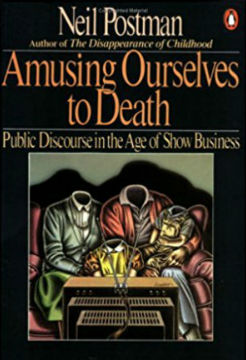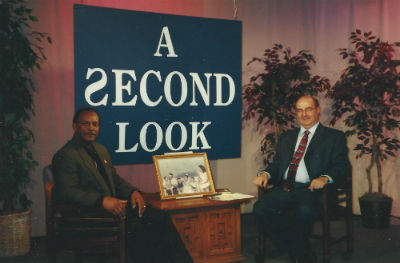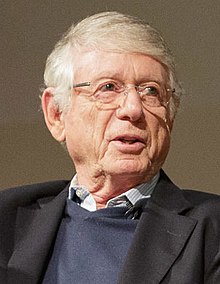2018 – The Season of Our (Media) Discontent
By Neil Earle
 Timeless dissection of TV news still speaks to us today.
Timeless dissection of TV news still speaks to us today.You don’t have to be a rabid Trumpster to think that something is very wrong with our national media. Only 32% now trust TV as a reliable source of what is going on.
Not long ago Peter Rosenberger wrote in the Memphis Commercial Appeal on the topic of "Outrage: Our new political pastime."
As a professional caregiver he decried "the rage-fuelled tweeters, commentators and marchers” and "the voices (on TV mostly) berating us about what we should rage at today." I wrote a piece to the Editor supporting his article. I’ve been involved in formal journalism now since 1969 – involving both point and television – and feel disappointed about what is happening to our marvelous communications industry.
2018’s Wild Ride
Move over, Mr. Toad. Political coverage on television has been 2018’s wild wild ride. How embarrassing now to some major news reporters about the dozens and dozens of hours given to Stormy Daniels' lawyer, the “in and out again” coverage of the admittedly poignant Separation Crisis at the Border (policies 4 Presidents endorsed), the comparison of President Trump's brief Helsinki meeting to 9/11 (!) and the minor flaps over the latest “tell alls” from Washington insiders. Throw in too the newsroom fawning over Bob Woodward of Watergate fame defending his latest ponderous “hasty pudding” memoir. And (dare we say it?) wasn’t there something a little unbalanced about the unceasing coverage given to the passing of Senator John McCain and President George H.W. Bush?
What a year for pressing our emotional buttons, more and more TV’s specialty it seems.
 Neil and an MLK Day interview: He hosted this cable show in Los Angeles for 16 years.
Neil and an MLK Day interview: He hosted this cable show in Los Angeles for 16 years.Television has great strengths. It can perform an almost “Bardic” function in knitting us together as a collective community. Most my age will never forget the live coverage given to President Kennedy’s funeral in 1963 and the Apollo 11 moon landing in 1969 – public events mediated with taste and moderation. We remember Al Michael’s “Do you believe in miracles?” when American college kids beat the Russian hockey team in 1980 or the President helping us all process the Challenger space shuttle tragedy in 1986.
“Amusing ourselves to Death?”
In the 1980s social critic Neil Postman wrote about TV’s disturbing penchant for immediacy at all costs, for attention-getting, the feeling of “being there” that can be so easily manipulated. Sometime back, Edward Jay Epstein exposed a documentary “Hunger in America” featuring the sad graphic of a supposedly starving child which was actually a baby suffering from premature birth. It was justified as “well, in that area children were dying of malnutrition.” This is subtle deception, the codes of “show business” intruding on the facts. So much “news” is actually “olds” – how many times were we shown dated footage of terrified high schoolers fleeing Parkland School back in February or protestors in Paris, the current feast for the eyeballs.
 Jane Pauley.
Jane Pauley.Here’s how media can mislead. On December 16 NBC-TV led with a poll stating 64% of Americans don’t believe the White House view of the Russian collusion charge. Problem – it was an NBC/Wall Street Journal poll! Leading with their own poll – not good. Not so incidentally, the reporter making this breathless claim was the same pundit who interviewed the alleged "third witness" against Judge Kavanaugh in September. This after telling us her guest was unvetted (and who later admitted her own fraudulence). The New York Times wouldn’t touch it, not so television. Shame and double shame!
Postman bewailed the fusion of TV entertainment and politics. Today entertainment figures – quite accomplished in themselves – migrate into news reporting. Trouble is they’ve been marinated in what Aristotle called “Spectacle,” where almost every subject becomes a breathless over-the-top emotionalized experience. Getting attention is everything! Hyperbole is the stock in trade. A report of the separation anxieties at the border ended with “The Statue of Liberty is weeping tonight” forgetting, as one commentator mentioned, “Lady Liberty also holds a book in her left hand – a book, an emblem of law and order!”
 Ted Koppel.
Ted Koppel.A Nervous System Overwrought?
Sometimes 2018’s hue and cry resembled a complicated system having a nervous breakdown. Too often the cable networks especially resembled, in Rosenberger's droll analogy, a shrill version of Hollywood Squares with “fuming pundits shouting over each other." Postman deplored turning journalists into stars (“spending more time with their stylists than their scripts”).
Even former veterans like Ted Koppel deplored 2018 and Ted Turner critized his own creation, CNN. There is probably no way to completely “fix” all this except to be aware of it. Karma comes in. Snarky editorial comments can backfire. Example: a clip on the Mueller investigation a year ago ended with “they're closing in." A year ago! Worse, the TV journalist on the reporter’s right had vacationed with the Obamas. Objectivity, anyone? How about some full disclosure every now and then? Or an apology?
 Ted Turner
Ted TurnerNews is a production, a major business enterprise subject to the judgments of stockholders and news editors, concerned about budgeting (“we’ve sent a whole team to the border, they must get something!”), cruel time pressures (host eyes always on the clock) and what will “sell” (market share).
Here’s good news. Driving 1700 miles across seven states in 2017 I found that America is more like Steve Hartman’s folksy follow-ups on CBS each week or Jane Pauley’s “Sunday morning” than the hyped up breathless “News Alerts” which can make you think the roof is caving in. It isn’t. Our times are scary enough. We don’t need the hype or the Brady Bunch on steroids. Really, we don’t.
(Memphis resident and journalist Neil Earle is a pop culture specialist. He served as a member of the DCTV board in Duarte, California and a stint as a syndicated TV columnist.)